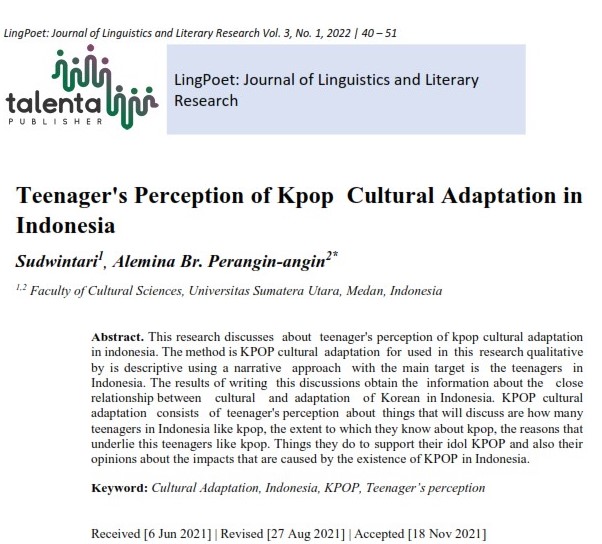Teenager's Perception of Kpop Cultural Adaptation In Indonesia
DOI:
https://doi.org/10.32734/lingpoet.v3i1.6319Keywords:
Cultural Adaptation, Indonesia, KPOP, Teenager’s perceptionAbstract
Abstract. This research discusses about teenager's perception of kpop cultural adaptation in indonesia. The method is KPOP cultural adaptation for used in this research qualitative by is descriptive using a narrative approach with the main target is the teenagers in Indonesia. The results of writing this discussions obtain the information about the close relationship between cultural and adaptation of Korean in Indonesia. KPOP cultural adaptation consists of teenager's perception about things that will discuss are how many teenagers in Indonesia like kpop, the extent to which they know about kpop, the reasons that underlie this teenagers like kpop. Things they do to support their idol KPOP and also their opinions about the impacts that are caused by the existence of KPOP in Indonesia.
Keyword: Cultural Adaptation, Indonesia, KPOP, Teenager’s perception
Abstrak. Penelitian ini membahas tentang persepsi remaja terhadap adaptasi budaya KPOP di Indonesia. Metode yang digunakan dalam adaptasi budaya KPOP adalah penelitian kualitatif dengan metode deskriptif menggunakan pendekatan naratif dengan sasaran utama adalah remaja di Indonesia. Hasil dari penulisan diskusi ini memperoleh informasi tentang hubungan erat antara budaya dan adaptasi bahasa Korea di Indonesia. Adaptasi budaya KPOP terdiri dari persepsi remaja tentang hal-hal yang akan dibahas adalah berapa banyak remaja di Indonesia menyukai KPOP, sejauh mana mereka tahu tentang KPOP, alasan yang mendasari remaja ini menyukai KPOP. Hal-hal yang mereka lakukan untuk mendukung KPOP idola mereka dan juga pendapat mereka tentang dampak yang ditimbulkan oleh keberadaan KPOP di Indonesia.
Kata Kunci : Adaptasi Budaya, Indonesia, KPOP, Persepsi Remaja
Downloads
References
Kluckhohn.C, In Lerner and H.D. Lasswell (Ed). (1951). The Policy Sciences, The Study of Culture, CA: Stanford University Press, Stanford.
Schein. E.H. (1990). Organizational Culture American Psychologist. London: Routledge.
Lee. H.W. (2006). “The Business Review,’’ in International Human Resource Management Can Be Achieved Through Cultural Studies and Relevant Training, 5(2), pp.95, [online]. Available. Proquest
Bodley. J.H. (2011). Cultural Anthropology: Tribes, States, and the Global Systems,5rd, Mayfield Publishing Company, USA.
Walsham, G. (2002). Cross-cultural software production and use: A structurational approach, MIS Quarterly, 26(4), pp.359-380.
Hall.E.T. (1990). Beyond Culture Garden City, NY: Anchor Books.
Gurung. A, & Prater. E, In:J.Glo, A Research Framework for the Impact of Cultural Differences on IT Outsourcing, Info Technol Manage, vol 9. P24-43,2006
Keesing.R.M, (1974). Theories of culture. Annual Review of Anthropology, 3rd, pp.79-97.
Hofstede.G. (2001). Culture's Consequences: Comparing Values, Behaviors, Institutions and Organizations Across Nations, 2nd, “in ExploringCulture: Exercises, stories, and synthetic cultures, Hofstede.G.J, and Pedersen.P.B, Maine: Intercultural Press, Yarmouth.
Trompenaars. F, (1993). Riding the Waves of Culture: Understanding Cultural Diversity in Business. The Economist Book, London.
Czinkota.A, & Ronkainen. A. (1993). International Marketing, 3rd, FL: The Dryden Press, Orlando.
Kanungo. R.P, (2006). “Cross Culture and Business Practice: Are They Conterminous or Cross Verging Cross Cultural.
Management. (2006). 13(1), pp.23, Available.Proquest
Liliweri. Alo, (2005). Prasangka & Konflik Komunikasi Lintas Budaya Masyarakat Multikultural, PT LkiS,Yogyakarta, p.140.
Migration Policy Institute. (2019). International migrants by country of destination 1960-2015. Department of Economic and Social Affairs. [online]. Available from United Nations, https://www.migrationpolicy.org/programs/data-hub/charts/international- migrants-country-destination-1960-2019. [Accessed: Mei.17,2021]
Kim.Y.S, (2001) “Host Communication Competence And Psychological Health: Exploring Cross-Cultural Adaptation Of Korean Expatriate Workers In The U.S. , “Journal of Intergroup Relations, vol 28, no.2, pp.33–47.
Kim.Y.Y, & Kim.Y.S, (2004). “The Role Of Host Environment In Cross-Cultural Adaptation: A Comparison Of American Expatriates In South Korea And Their Korean Counterparts In The United States, “Asian Communication Research, vol 3, no.1, pp 5–25.
Kim.Y. (1991). Intercultural Communication Competence: A Systems Theoretic View. In S. Ting-Toomey, & F. Korzenny (Ed), “Cross-cultural interpersonal communication, vol 2, no.4 pp. 259–275.
Kim.Y. (2015). “Finding A “Home†Beyond Culture: The Emergence of Intercultural Personhood in The Globalizing World, “International Journal of Intercultural Relations, vol 46, pp. 3–12. doi:10.1016/j.ijintrel.2015.03.018
B.Gudykunst, (Ed), Theories in intercultural communication, CA:Sage, Newbury Park, p.299–321.
Creswell. John. W. (2013). Qualitative Inquiry and Research Design Choosing among Five Approaches 3rd ed. SAGE Publications, United States of America.

Downloads
Published
How to Cite
Issue
Section
License
Copyright (c) 2022 LingPoet: Journal of Linguistics and Literary Research

This work is licensed under a Creative Commons Attribution-ShareAlike 4.0 International License.












